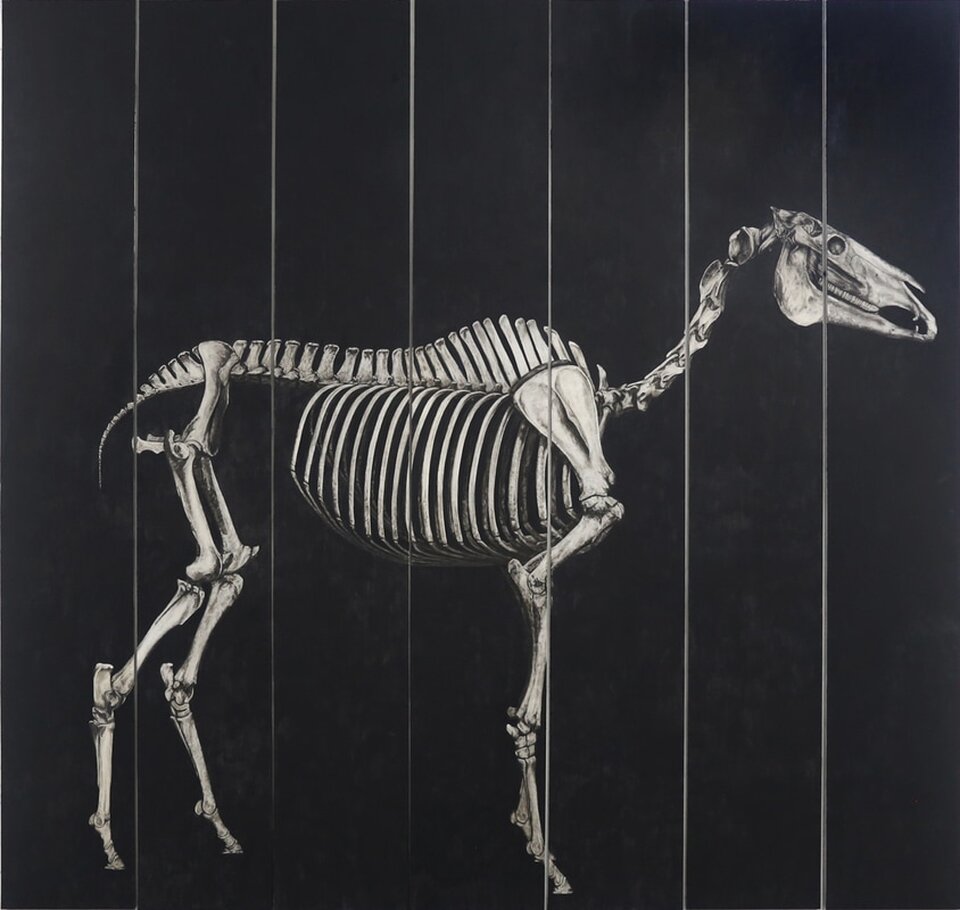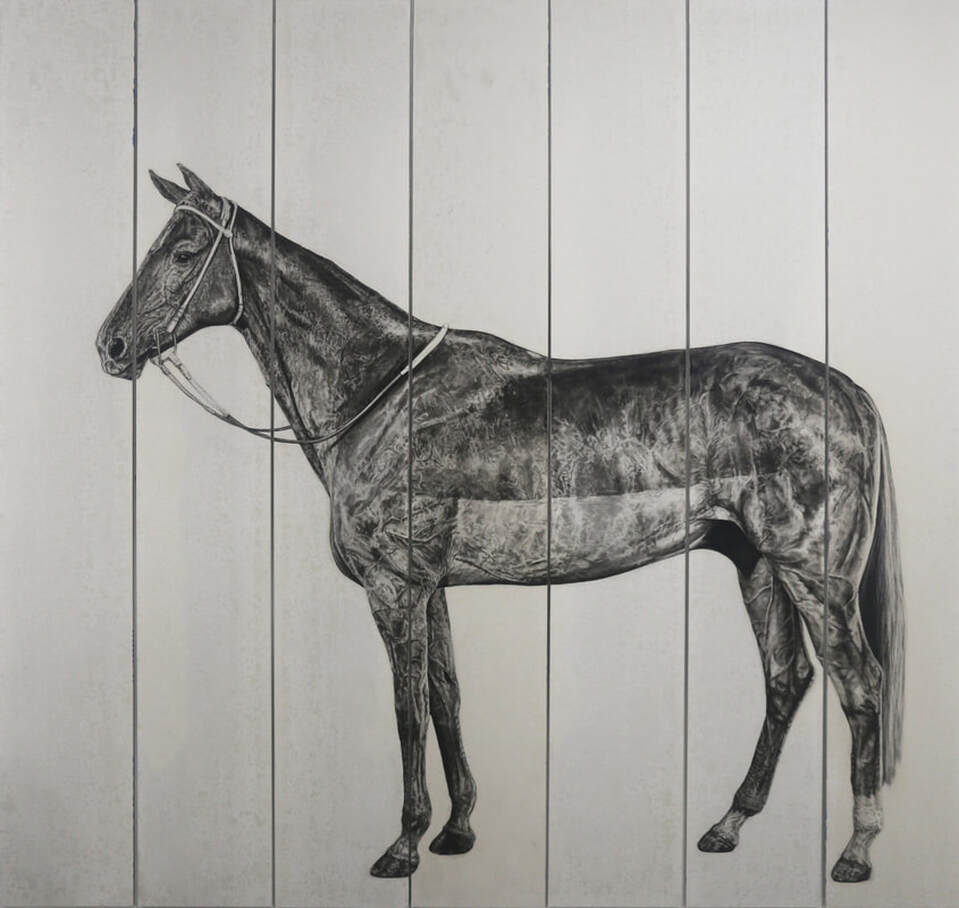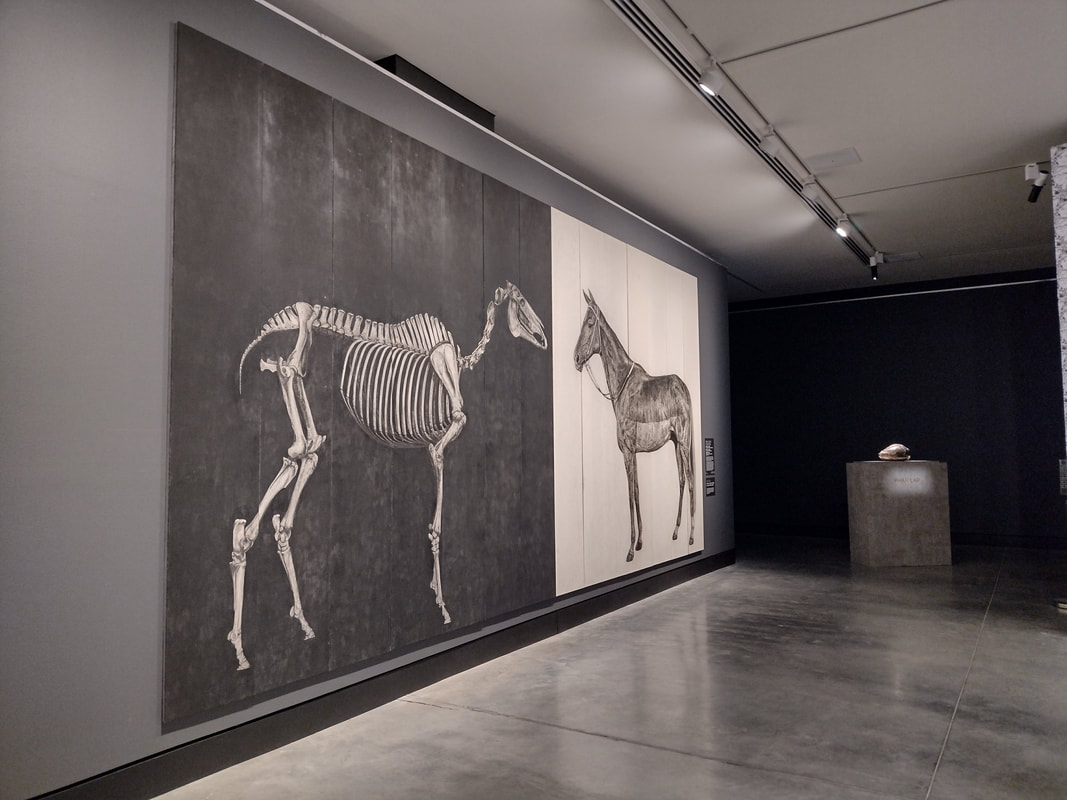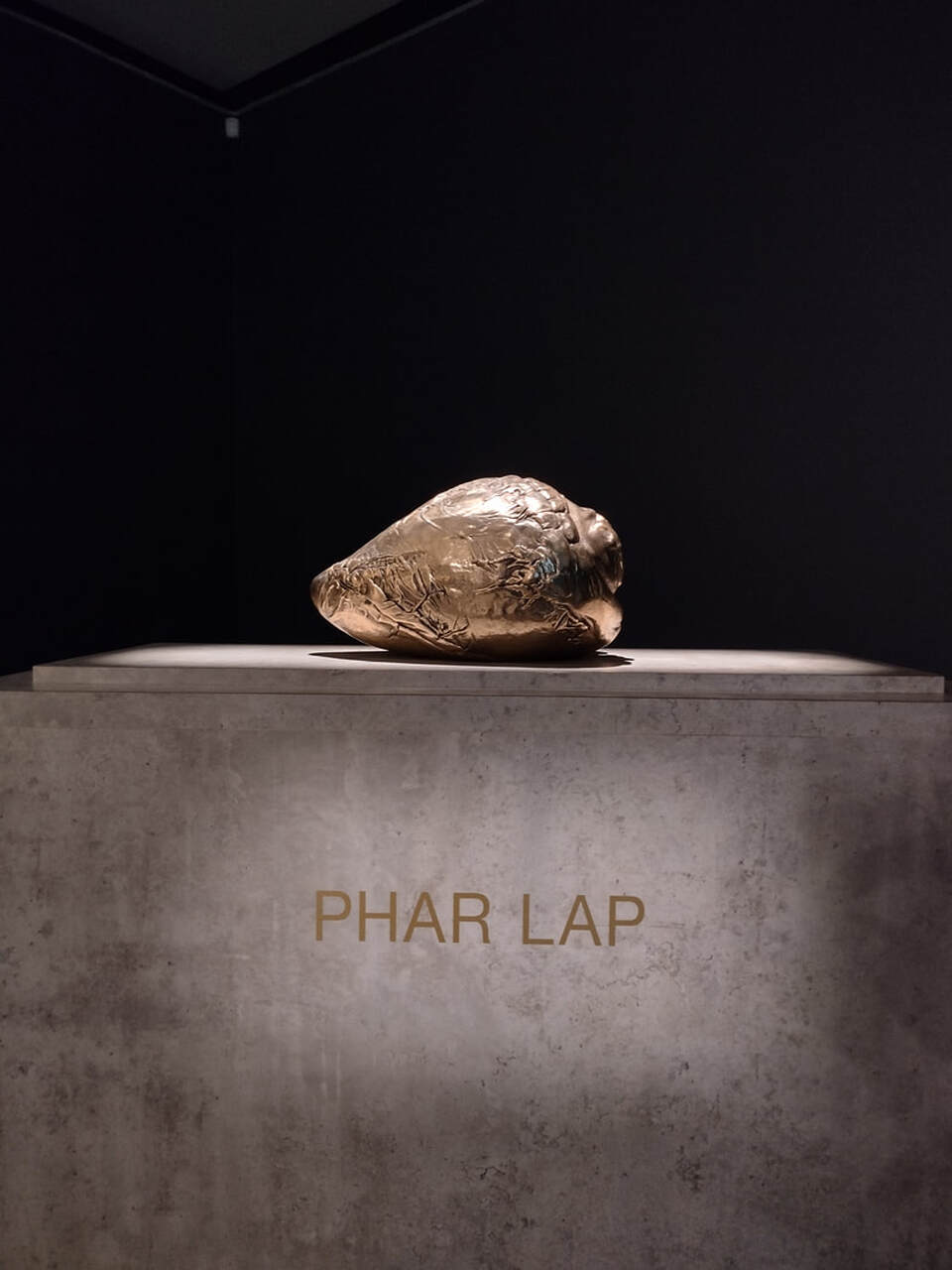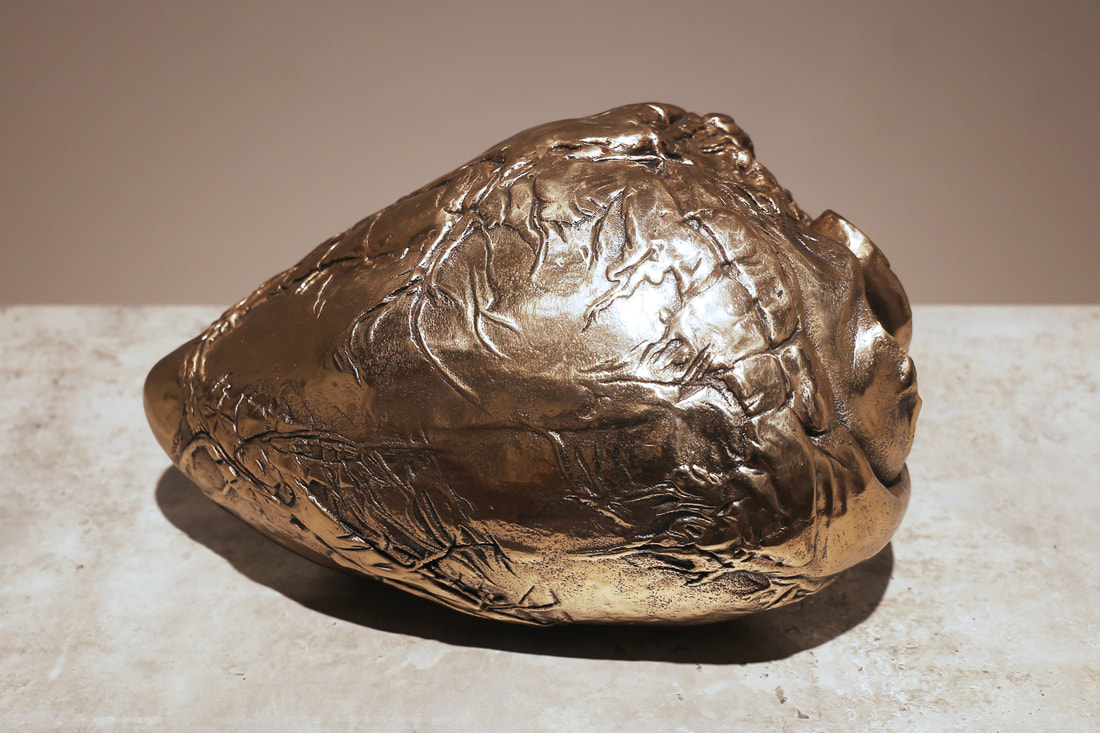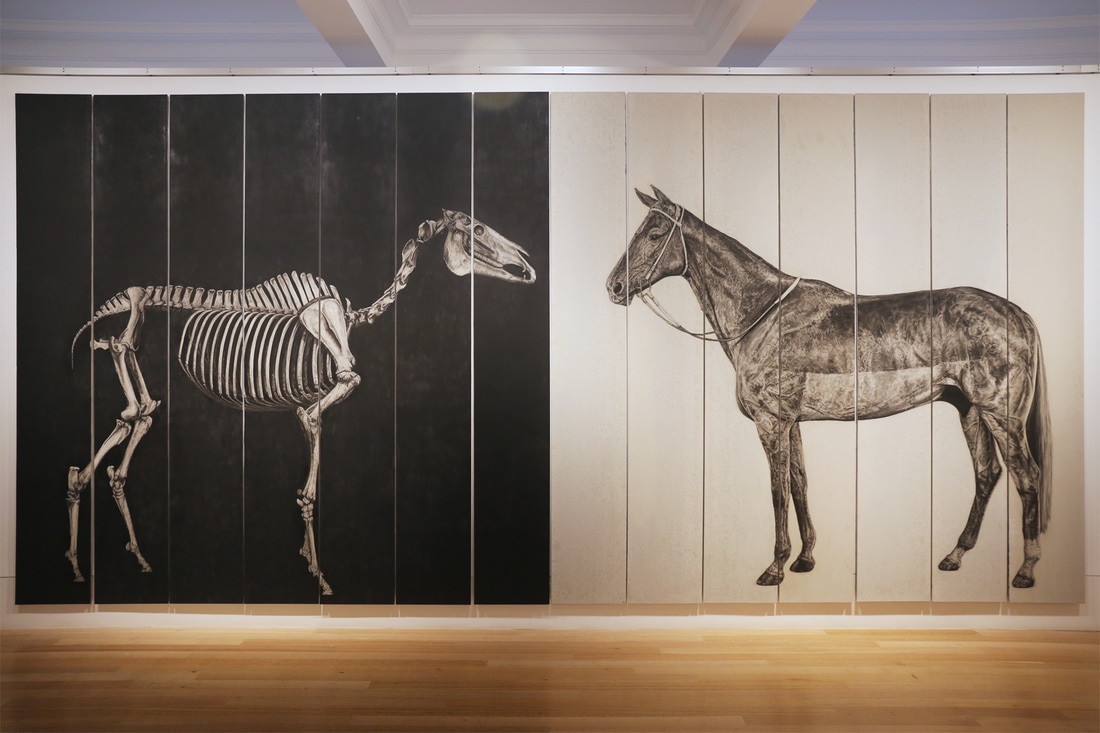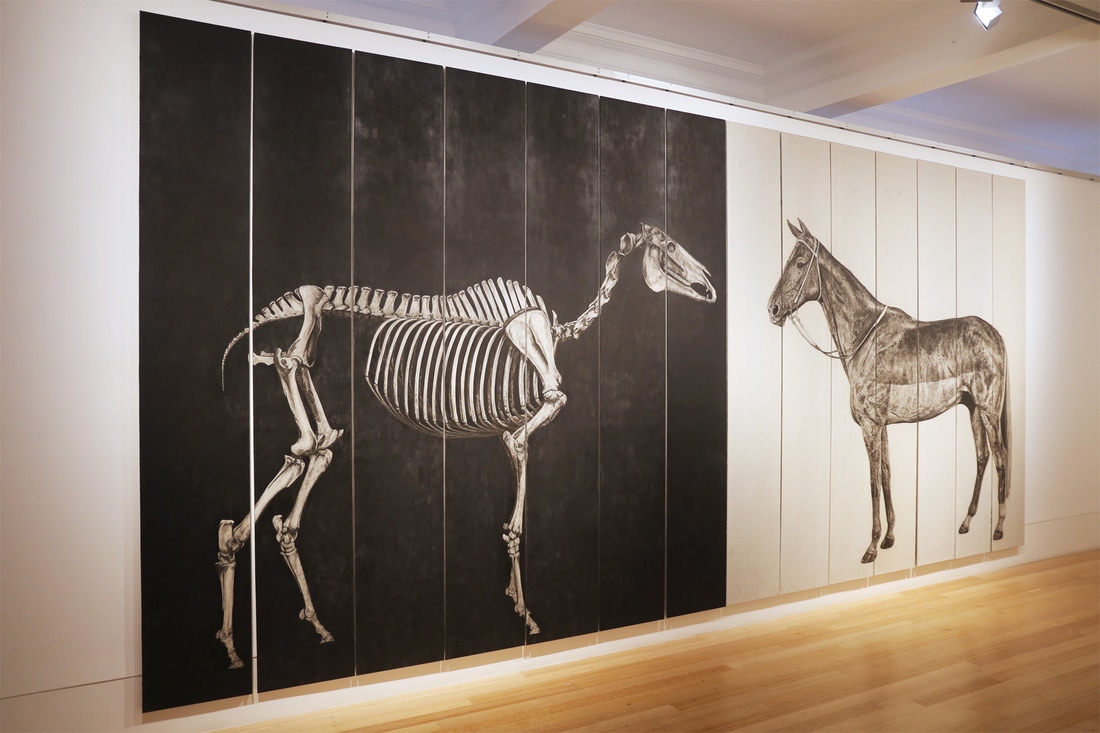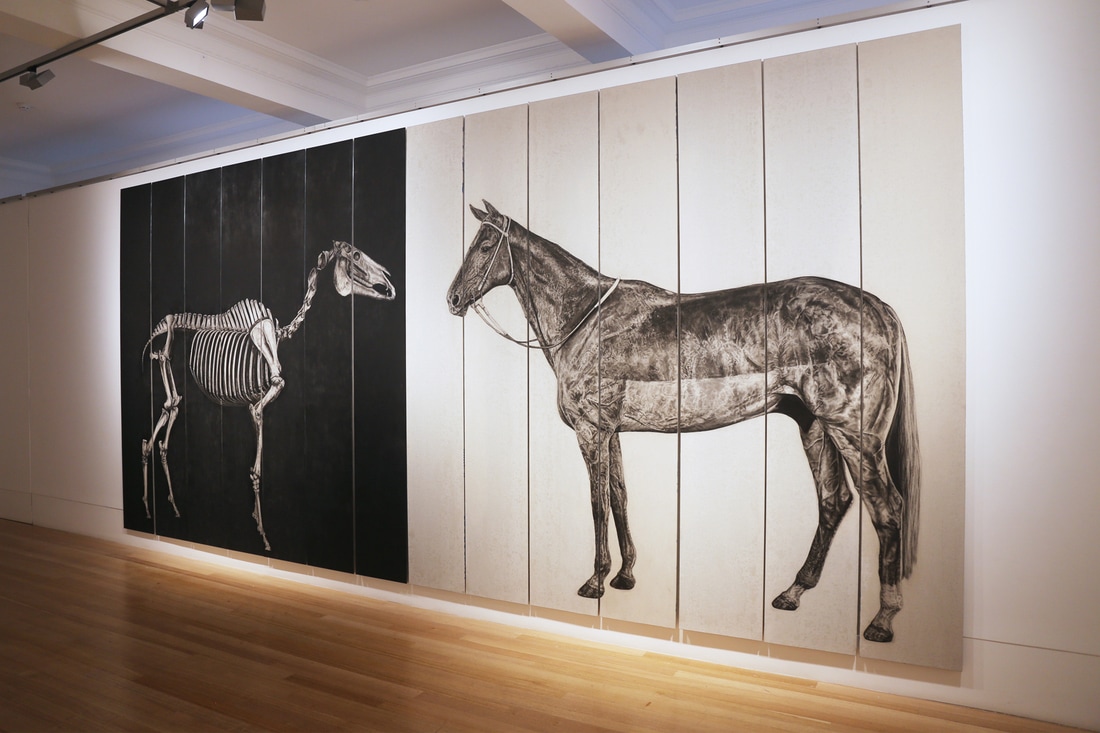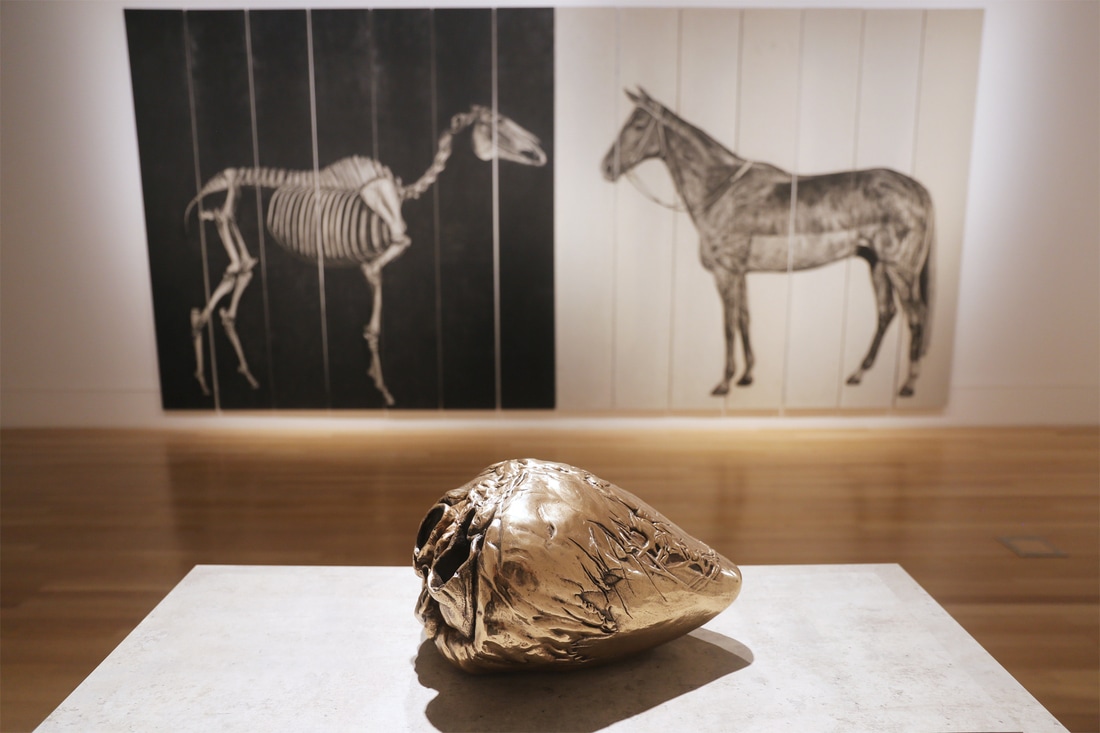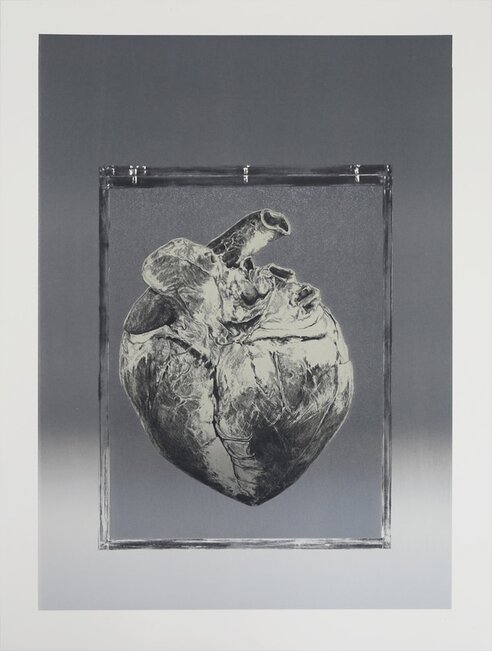GIFT HORSE
For over 80 years, Phar Lap has endured as an Australian cultural icon through the numerous newspaper reports, articles, film, television, museum displays and song. It is this ongoing significance in our national psyche and the significant cultural investment that Anna Louise Richardson explores in this large scale drawing and sculptural installation.
Phar Lap-Bone and Phar Lap-Skin are accurate and analytical drawings of the exterior and skeletal structure rendered in charcoal and sombre tones on cement fibreboard. Phar Lap’s larger than usual heart is accurately reproduced as a bronze sculpture in Wonder Horse. Each element of the installation is executed in remarkable and painstaking detail. The life-size scale reinforces the legendary stature of the horse. In the same way Phar Lap’s remains were dissected and distributed for display at institutions across Australasia, Richardson has dissected the anatomy of the horse however she presents the elements together as a poignant yet unsettling reflection of our complex need to revere this animal as an icon.
Phar Lap: legend of thoroughbred racing, national icon and the archetypal ‘Aussie Battler’. Phar Lap’s rags to riches story and exploits on the racecourse lifted the hopes of a generation during the Great Depression. Bred in New Zealand, he was purchased at yearling sales for a relatively modest sum by trainer Harry Telford on behalf of American businessman David J. Davis. The gangly, wart faced yearling was transported to Australia where, legend has it, his new owner dismissed him based on his looks. Telford remained steadfast in his belief in the horse. Despite an unpromising start Phar Lap went on to win 37 of 51 races during his four year racing career. Wins included the 1930 WS Cox Plate and Melbourne Cup, which he secured three days after someone tried to shoot him walking back from morning track work. He was generally an exciting and convincing winner, regularly beating his competitors by many lengths. Phar Lap's legendary status was solidified by his striking red coat, significant stature, and his autopsy finding that suggests his was heart was a remarkable size, weighing 6.2 kilograms (14 lb), compared with a normal horse's heart at 3.2 kilograms.
In 1932 Phar Lap was sent to North America where he won the rich Agua Caliente Handicap in Mexico in record time. Several days later he collapsed at his stables in San Francisco, dying hours later. His death was attributed to acute colic but many suspected foul play. His sudden demise resulted in an outpouring of grief and anger and remains the subject of intrigue. Following his death, his remains were dispersed to cultural institutions across Australia and New Zealand reflecting the claims on him by both Australia and New Zealand. His mounted hide is on permanent display in the Australia Gallery Museum of Victoria in Melbourne (still the Museum’s most popular exhibit). His skeleton is mounted and on permanent display at the National Museum of New Zealand in Wellington. His enormous heart was preserved and is on permanent display National Museum of Australia, Canberra, and is the object visitors most request to see at the Museum.
Written by Lisa Woolfe and Todd Fuller.
Phar Lap-Bone and Phar Lap-Skin are accurate and analytical drawings of the exterior and skeletal structure rendered in charcoal and sombre tones on cement fibreboard. Phar Lap’s larger than usual heart is accurately reproduced as a bronze sculpture in Wonder Horse. Each element of the installation is executed in remarkable and painstaking detail. The life-size scale reinforces the legendary stature of the horse. In the same way Phar Lap’s remains were dissected and distributed for display at institutions across Australasia, Richardson has dissected the anatomy of the horse however she presents the elements together as a poignant yet unsettling reflection of our complex need to revere this animal as an icon.
Phar Lap: legend of thoroughbred racing, national icon and the archetypal ‘Aussie Battler’. Phar Lap’s rags to riches story and exploits on the racecourse lifted the hopes of a generation during the Great Depression. Bred in New Zealand, he was purchased at yearling sales for a relatively modest sum by trainer Harry Telford on behalf of American businessman David J. Davis. The gangly, wart faced yearling was transported to Australia where, legend has it, his new owner dismissed him based on his looks. Telford remained steadfast in his belief in the horse. Despite an unpromising start Phar Lap went on to win 37 of 51 races during his four year racing career. Wins included the 1930 WS Cox Plate and Melbourne Cup, which he secured three days after someone tried to shoot him walking back from morning track work. He was generally an exciting and convincing winner, regularly beating his competitors by many lengths. Phar Lap's legendary status was solidified by his striking red coat, significant stature, and his autopsy finding that suggests his was heart was a remarkable size, weighing 6.2 kilograms (14 lb), compared with a normal horse's heart at 3.2 kilograms.
In 1932 Phar Lap was sent to North America where he won the rich Agua Caliente Handicap in Mexico in record time. Several days later he collapsed at his stables in San Francisco, dying hours later. His death was attributed to acute colic but many suspected foul play. His sudden demise resulted in an outpouring of grief and anger and remains the subject of intrigue. Following his death, his remains were dispersed to cultural institutions across Australia and New Zealand reflecting the claims on him by both Australia and New Zealand. His mounted hide is on permanent display in the Australia Gallery Museum of Victoria in Melbourne (still the Museum’s most popular exhibit). His skeleton is mounted and on permanent display at the National Museum of New Zealand in Wellington. His enormous heart was preserved and is on permanent display National Museum of Australia, Canberra, and is the object visitors most request to see at the Museum.
Written by Lisa Woolfe and Todd Fuller.
The Gallery @ Bayside Arts & Culture Centre, Melbourne, VIC.
1 April - 23 April 2017.
Biennale of Australian Art, Ballarat, VIC.
21 September - 6 November 2018.
RITUAL, There Is Gallery, Perth, WA.
Curated by Professor Ted Snell.
22 February - 16 March 2019.
Storylines, Maitland Regional Arts Gallery, Maitland, NSW
Curated by Todd Fuller and Lisa Woolfe.
4 December 2021 - 27 February 2022.
1 April - 23 April 2017.
Biennale of Australian Art, Ballarat, VIC.
21 September - 6 November 2018.
RITUAL, There Is Gallery, Perth, WA.
Curated by Professor Ted Snell.
22 February - 16 March 2019.
Storylines, Maitland Regional Arts Gallery, Maitland, NSW
Curated by Todd Fuller and Lisa Woolfe.
4 December 2021 - 27 February 2022.
Anna Louise Richardson, Phar Lap: Skin, 2017, charcoal on cement fibreboard, 300cm x 322cm. (right)
Anna Louise Richardson, Phar Lap: Bone, 2017, charcoal and ink on cement fibreboard, 300cm x 322cm. (left)
Anna Louise Richardson, Phar Lap: Bone, 2017, charcoal and ink on cement fibreboard, 300cm x 322cm. (left)
Anna Louise Richardson, Wonder Horse, 2017, bronze, vinyl, concrete laminate, edition of 3 + 1AP, 140cm x 100cm x 45cm.
Anna Louise Richardson, Gift Horse, 2016, Lithograph on cotton rag paper, edition of 10 + 3AP, 70cm x 50cm.
Gift Horse was supported by the Government of Western Australia Department of Culture and the Arts.
